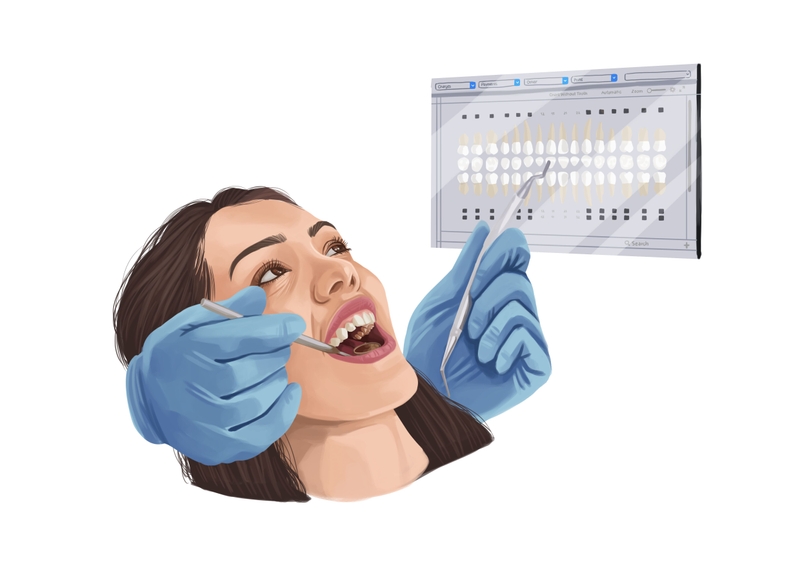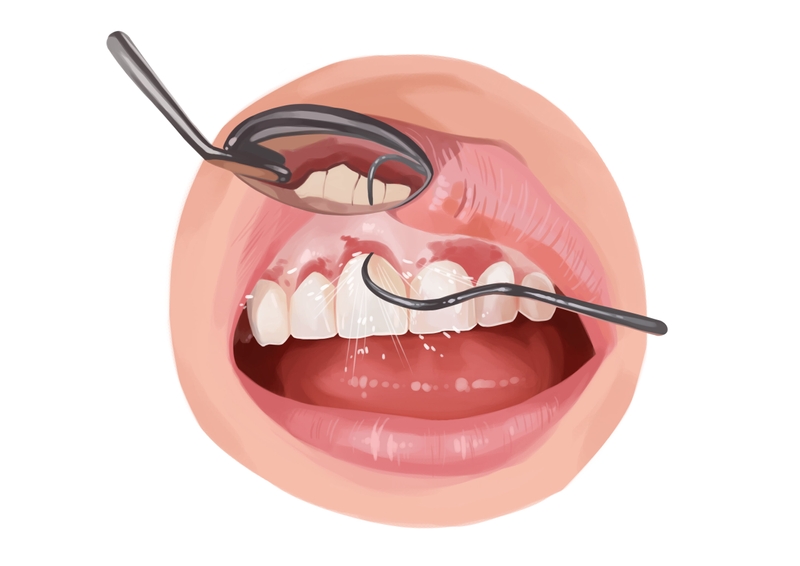- Dry mouth is not a disease. It is a symptom of other medical conditions or a side effect of many medications and drugs.
- Symptoms of dry mouth include stickiness, dryness, or burning in the mouth and throat. You may also have difficulty chewing, swallowing or speaking, a decreased sense of taste and a number of other symptoms.
- Lack of saliva can lead to tooth decay, demineralization, tooth sensitivity and oral infections. Treatment for dry mouth is primarily about addressing the symptoms.
Experiencing a dry mouth? Book a dentist appointment quickly. Use Authority Dental to find emergency dental services near you.
Do you suffer from dry mouth? Here's everything you need to know.
Dry mouth causes

Picture by Authority Dental under CC 2.0 license
Dry mouth causes include:
chemotherapy,
radiotherapy,
uncontrolled diabetes,
hormonal changes,
nerve damage,
dehydration,
pregnancy,
lifestyle,
certain drugs and medications, and
diseases like HIV/AIDS, Alzheimer's disease, anemia, cystic fibrosis, rheumatoid arthritis, Sjögren’s disease, hypertension, Parkinson's disease, stroke, and mumps.
Those receiving cancer treatment, especially to the head and neck regions, are very likely to suffer from dry mouth at some point. The associated procedures are highly toxic to other parts of the body. Those with Sjögren disease are likewise almost sure to suffer from xerostomia.
Over 400 OTC and prescription drugs commonly sold in the US can lead to or speed up the development of dry mouth. This side effect is linked to antidepressants, painkillers, antihistamines, decongestants, and more. Dry mouth is even more likely to occur if someone ingests a mixture of those regularly.
When it comes to patient-controlled factors, the most prominent are tobacco use, alcohol intake, and open-mouth breathing, especially at night. Avoiding these habits is an important part of treatment of xerostomia.
Symptoms of dry mouth
The following are signs of dry mouth you can look for:
stickiness, dryness, or burning in the mouth and throat,
trouble with chewing, swallowing, or speaking,
a diminished sense of taste,
intolerance of spicy, salty, or sour foods and drinks, cracked lips (especially the corners),
a dry, rough tongue,
mouth sores,
inflammation in the mouth,
a hoarse throat,
frequent thirst, and
snoring.
You may only experience some of these symptoms. Nonetheless, dry mouth is associated with many oral health complications. Act before you have a more serious problem on your hands.
Why is saliva so important to your health?

Picture by Authority Dental under CC 2.0 license
Saliva does not only moisten the mouth. It is necessary to cleanse it, prevent bacterial and fungal infections, and digest food. A lack of it may lead to severe decay, demineralization, tooth sensitivity, and oral infections. This is why it’s important not to underestimate the danger of dry mouth.
Oral complications also include:
periodontal infections,
thrush,
malnutrition,
inability to wear dentures,
ulcers, and
sores.
How to get rid of dry mouth?
Treatment is mostly about targeting symptoms. There are some things you can do from home, but it is important to report to the dentist as well. Dry mouth can also be detected during bi-yearly checkups.
Home remedies
Follow these tips. Your dentist is likely to recommend some of them as well:
Use fluoridated products such as toothpaste and varnishes. They help prevent issues like tooth decay.
Lubricate your lips with balm. The corners of your mouth are especially likely to be dry or cracking.
Avoid salty or spicy food. Those will be uncomfortable in your mouth, as they won’t dissolve in saliva.
Do not eat food rich in sugar. It will dehydrate your mouth further and can lead to tooth decay and bad breath.
Drink water with every meal. It will make swallowing easier.
Eat sugar-free gum and candies. They help by increasing saliva flow. Those with xylitol can also help prevent tooth decay.
Suck on ice chips. This helps moisturize the mouth.
Sip water throughout the day. Keep your whole body hydrated as much as you can.
Steer clear of caffeine and alcohol. Those dry out not only your mouth but the entire body. Buy alcohol-free mouthwash, too.
Use a humidifier at night. The more moisture in the air, the more can enter your body. It will help hydrate your air tracts gently as well.
Avoid tobacco at all costs. It dries out your mouth and irritates soft tissues.
If you wear a denture, reline it regularly and use adhesive.
Invest in OTC saliva substitutes containing xylitol, carboxymethyl cellulose or hydroxyethyl cellulose.
Breathe through your nose and not your mouth. This prevents your mouth from drying out and keeps possible microorganisms in the air from entering your mouth. Your nose is prepared to stop them from going into your air tract.
Professional treatment
If you experience symptoms of dry mouth, you should see a dentist. It is associated with many complications, so he or she might have to treat you for those anyway.
Here is what you can expect from a dental professional in the case of xerostomia.
You may get a prescription-strength fluoride toothpaste, toothpaste that contains betaine, or a gel that will neutralize acids.
Bitewing radiographs might be taken to examine the extent of the problem.
You might be advised to change medication you are taking. The dentist will let you know which might be causing the issue. Follow up with your doctor to look for alternatives, change the dosage, or consider ceasing treatment.
Fluoride trays to wear at night are also likely. Those will protect your teeth.
The dentist may advise a chlorhexidine rinse to use daily.
If your dentist diagnoses the cause as salivary gland dysfunction, he or she might give you a prescription for salivary stimulants.
Curing malfunctioning salivary glands is currently not satisfactorily available. Treatment has to be, unfortunately, symptom-based.
FAQ
Is dry mouth a serious problem?
If ignored, it can be. There are serious complications associated with letting your mouth dry out. This includes bacterial and fungal infections, tooth decay, and periodontal disease. What’s more, it may be a sign of an underlying medical problem.
If you treat your dry mouth, it is not a serious condition.
How long does dry mouth last?
How to prevent dry mouth while sleeping?
References
- Treating the Treatment: Toxicity of Cancer Chemotherapy
- Oral Health in America: A Report of the Surgeon General
- Oral Health Topics
- The functions of saliva
- Fluoridation
- The effect of xylitol on dental caries and oral flora
- Carboxymethyl Cellulose
- Concise Review: Salivary Gland Regeneration: Therapeutic Approaches from Stem Cells to Tissue Organoids
Nichole McKenna, DDS
Direct radiation treatment to the head/neck region can cause permanent damage to salivary glands, leading to life-long xerostomia.